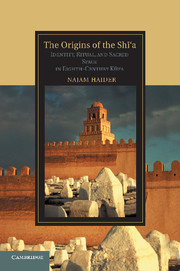Book contents
- Frontmatter
- Contents
- Maps and Tables
- Acknowledgments
- Note on Transliteration and Dates
- Abbreviations
- Map I The Middle East in the early Muslim period
- Part one Narratives And Methods
- 1 Kūfa and the Classical Narratives of Early Shī‘ism
- 2 Confronting the Source Barrier
- Part two Case Studies
- Part three The Emergence of Shī’ism
- 9 Conclusion
- Bibliography
- Index
2 - Confronting the Source Barrier
A New Methodology
from Part one - Narratives And Methods
Published online by Cambridge University Press: 07 October 2011
- Frontmatter
- Contents
- Maps and Tables
- Acknowledgments
- Note on Transliteration and Dates
- Abbreviations
- Map I The Middle East in the early Muslim period
- Part one Narratives And Methods
- 1 Kūfa and the Classical Narratives of Early Shī‘ism
- 2 Confronting the Source Barrier
- Part two Case Studies
- Part three The Emergence of Shī’ism
- 9 Conclusion
- Bibliography
- Index
Summary
Every study of early Shī‘ism is fundamentally hampered by a lack of contemporaneous historical sources. Very few chronicles can verifiably be dated to the start of the 2nd/8th century, leaving scholars with a myriad of sources from subsequent centuries, which claim an unverifiable reliance on earlier written materials. The degree to which these have been manipulated or altered to fit polemical agendas remains an open question. In the case of heresiographies, for example, it is likely that historical materials were recrafted to fit a particular theological worldview in which one sect was saved and seventy-one (or seventy-two, or seventy-three) were destined for Hell. Faced with such a dilemma, many historians have concluded that substantive research into early Islam is not possible without the discovery of new sources or developments in fields such as archeology or numismatics. This chapter argues for the dating of an entire category of (albeit nonhistorical) sources to the early 2nd/8th century and offers an avenue for utilizing these texts to derive historical information. The first section summarizes important recent scholarship that places ritual law traditions in as early as the late 1st/7th century. The second section lays out the methodology employed in Chapters 3 through 5.
The search for early sources
In the second volume of his seminal 1889 work, Muhammedanishe Studien, Ignaz Goldziher expressed severe skepticism about the entirety of the ḥadīth literature. He argued that political and polemical factors led to a proliferation of fabrication, which made it virtually impossible to derive any factual information from the multitude of seemingly historical traditions preserved in the major collections. In the decades that followed, scholars explored the implications of Goldziher’s work for a variety of fields, from early Islamic historiography to the origins and development of Islamic law. They generally adhered to one of two positions with respect to the sources. The first was grounded in a thoroughgoing skepticism that rejected the entirety of the Muslim tradition as the product of a back projection of expectations onto the life of the Prophet. The second affirmed the general utility of the traditions as historical sources while attempting to sift out those reports that appeared to reflect later bias or polemical debates. The two sides have followed parallel tracks through the last century, with little progress toward a resolution of this fundamental epistemological disagreement. Skeptics consider traditions as fabrications unless proven otherwise, whereas their opponents assume veracity in the absence of proof of forgery.
- Type
- Chapter
- Information
- The Origins of the Shi'aIdentity, Ritual, and Sacred Space in Eighth-Century Kūfa, pp. 24 - 54Publisher: Cambridge University PressPrint publication year: 2011



